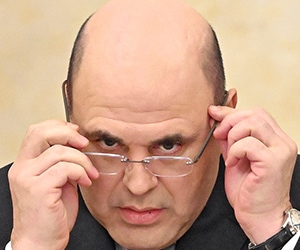A reshuffling at the top of Russia's political class.

Before the morning of January 16, most Russians never heard of Mikhail Mishustin, a bureaucrat who headed the country’s Federal Tax Service. Mishustin himself, some have speculated, was as surprised as anyone by the news; Vladimir Putin forced the resignation of Prime Minister Dmitry Medvedev and, seemingly overnight, tapped Mishustin as his replacement.
Yet, while the new No. 2 of the Russian political oligarchy was virtually unknown, Putin’s motives appeared far less mysterious. “It is unlikely that the appointment of Mishustin means that a political transition is underway in Russia,” says Chris Miller, professor of international history at Tufts University’s Fletcher School of Law and Diplomacy. Putin, he says, isn’t grooming any successor. “He is preparing his plan to retain power.” Barred by law from running for a third consecutive term as president, Putin has proposed major changes to the country’s constitution in attempts to see more authority transferred away from the presidency to the Parliament and other government institutions—creating a power center outside the presidency. These changes, political analysts say, would allow him to wield power indefinitely.
Mishustin is respected within Russia’s business circless. With a background in information technology, he entered the state tax service in 1998 as an assistant and climbed the managerial ladder until reaching the top rung. He is credited with digitizing the Russian fiscal system and bringing millions of workers and small firms into the formal economy.
Mishustin lacks his own independent power base and needs to adhere closely to Putin’s priorities. “For now, that means increasing fiscal spending and investing more in the country’s ‘national projects,’ a series of infrastructure and investment programs the government approved but implementing slowly.” This is where the new prime minister could prove that his nomination was no accident. “Even if Mishustin’s political effect is small, if Russian government spending increases as a result of his appointment his economic impact could be larger than anyone anticipates.”



